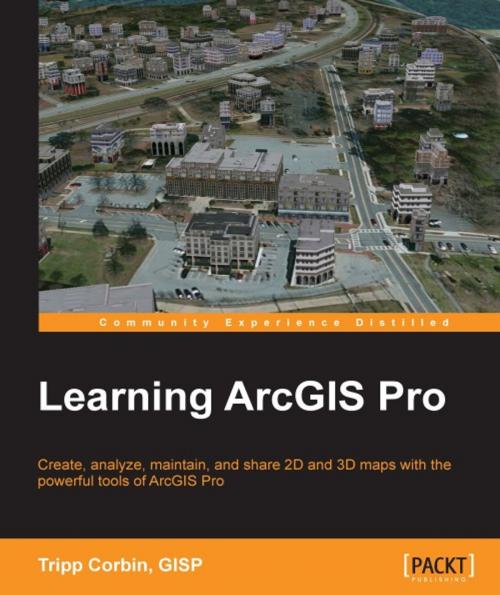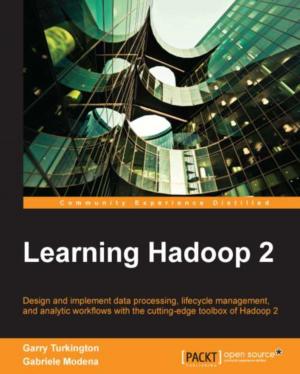Learning ArcGIS Pro
Nonfiction, Computers, Advanced Computing, Programming, Data Modeling & Design, Application Software, Internet| Author: | Tripp Corbin, GISP | ISBN: | 9781785289880 |
| Publisher: | Packt Publishing | Publication: | July 31, 2016 |
| Imprint: | Packt Publishing | Language: | English |
| Author: | Tripp Corbin, GISP |
| ISBN: | 9781785289880 |
| Publisher: | Packt Publishing |
| Publication: | July 31, 2016 |
| Imprint: | Packt Publishing |
| Language: | English |
Create, analyze, maintain, and share 2D and 3D maps with the powerful tools of ArcGIS Pro
About This Book
- Visualize GIS data in 2D and 3D maps
- Create GIS projects for quick and easy access to data, maps, and analysis tools
- A practical guide that helps to import maps, globes, and scenes from ArcMap, ArcScene, or ArcGlobe
Who This Book Is For
This book is for anyone wishing to learn how ArcGIS Pro can be used to create maps and perform geospatial analysis. It will be especially helpful for those that have used ArcMap and ArcCatalog in the past and are looking to migrate to Esri's newest desktop GIS solution. Though previous GIS experience is not required, you must have a solid foundation using Microsoft Windows. It is also helpful if you understand how to manage folders and files within the Microsoft Windows environment.
What You Will Learn
- Install ArcGIS Pro and assign Licenses to users in your organization
- Navigate and use the ArcGIS Pro ribbon interface to create maps and perform analysis
- Create and manage ArcGIS Pro GIS Projects
- Create 2D and 3D maps to visualize and analyze data
- Author map layouts using cartographic tools and best practices to show off the results of your analysis and maps
- Import existing map documents, scenes, and globes into your new ArcGIS Pro projects quickly
- Create standardized workflows using Tasks
- Automate analysis and processes using ModelBuilder and Python
In Detail
ArcGIS Pro is Esri's newest desktop GIS application with powerful tools for visualizing, maintaining, and analyzing data. ArcGIS Pro makes use of the modern ribbon interface and 64-bit processing to increase the speed and efficiency of using GIS. It allows users to create amazing maps in both 2D and 3D quickly and easily.
This book will take you from software installation to performing geospatial analysis. It is packed with how-to's for a host of commonly-performed tasks. You will start by learning how to download and install the software including hardware limitations and recommendations. Then you are exposed to the new Ribbon interface and how its smart design can make finding tools easier.
After you are exposed to the new interface, you are walked through the steps to create a new GIS Project to provide quick access to project resources. With a project created, you will learn how to construct 2D and 3D maps including how to add layers, adjust symbology, and control labeling. Next you will learn how to access and use analysis tools to help you answer real-world questions.
Lastly, you will learn how processes can be automated and standardized in ArcGIS Pro using Tasks, Models, and Python Scripts.
This book will provide an invaluable resource for all those seeking to use ArcGIS Pro as their primary GIS application or for those looking to migrate from ArcMap and ArcCatalog.
Style and approach
This book includes detailed explanations of the GIS functionality and workflows in ArcGIS Pro. These are supported by easy-to-follow exercises that will help you gain an understanding of how to use ArcGIS Pro to perform a range of tasks.
Create, analyze, maintain, and share 2D and 3D maps with the powerful tools of ArcGIS Pro
About This Book
- Visualize GIS data in 2D and 3D maps
- Create GIS projects for quick and easy access to data, maps, and analysis tools
- A practical guide that helps to import maps, globes, and scenes from ArcMap, ArcScene, or ArcGlobe
Who This Book Is For
This book is for anyone wishing to learn how ArcGIS Pro can be used to create maps and perform geospatial analysis. It will be especially helpful for those that have used ArcMap and ArcCatalog in the past and are looking to migrate to Esri's newest desktop GIS solution. Though previous GIS experience is not required, you must have a solid foundation using Microsoft Windows. It is also helpful if you understand how to manage folders and files within the Microsoft Windows environment.
What You Will Learn
- Install ArcGIS Pro and assign Licenses to users in your organization
- Navigate and use the ArcGIS Pro ribbon interface to create maps and perform analysis
- Create and manage ArcGIS Pro GIS Projects
- Create 2D and 3D maps to visualize and analyze data
- Author map layouts using cartographic tools and best practices to show off the results of your analysis and maps
- Import existing map documents, scenes, and globes into your new ArcGIS Pro projects quickly
- Create standardized workflows using Tasks
- Automate analysis and processes using ModelBuilder and Python
In Detail
ArcGIS Pro is Esri's newest desktop GIS application with powerful tools for visualizing, maintaining, and analyzing data. ArcGIS Pro makes use of the modern ribbon interface and 64-bit processing to increase the speed and efficiency of using GIS. It allows users to create amazing maps in both 2D and 3D quickly and easily.
This book will take you from software installation to performing geospatial analysis. It is packed with how-to's for a host of commonly-performed tasks. You will start by learning how to download and install the software including hardware limitations and recommendations. Then you are exposed to the new Ribbon interface and how its smart design can make finding tools easier.
After you are exposed to the new interface, you are walked through the steps to create a new GIS Project to provide quick access to project resources. With a project created, you will learn how to construct 2D and 3D maps including how to add layers, adjust symbology, and control labeling. Next you will learn how to access and use analysis tools to help you answer real-world questions.
Lastly, you will learn how processes can be automated and standardized in ArcGIS Pro using Tasks, Models, and Python Scripts.
This book will provide an invaluable resource for all those seeking to use ArcGIS Pro as their primary GIS application or for those looking to migrate from ArcMap and ArcCatalog.
Style and approach
This book includes detailed explanations of the GIS functionality and workflows in ArcGIS Pro. These are supported by easy-to-follow exercises that will help you gain an understanding of how to use ArcGIS Pro to perform a range of tasks.















